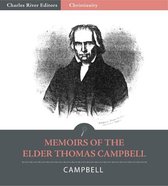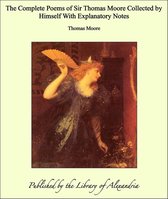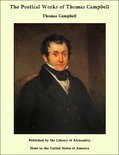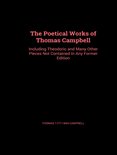The Poetical Works of Thomas Campbell Ebook Tooltip Ebooks kunnen worden gelezen op uw computer en op daarvoor geschikte e-readers.
Afbeeldingen
Artikel vergelijken
- Engels
- E-book
- 9781465629128
- 24 februari 2021
- Adobe ePub
Samenvatting
Thomas Campbell was born in Glasgow, July 27, 1777. He was of good family, his father being the youngest son of a Highland laird, Campbell of Kirnan, who could trace his descent from Gilespie le Camile, first Norman lord of Lochawe. As was (and is) usual with the younger sons of Scottish families of rank, Campbell’s father was destined for a commercial career. He commenced it in Virginia, where he entered into partnership with a kinsman, and returning with him to Scotland, carried on the business in Glasgow, till the wars between Great Britain and her American Colonies for a time seriously injured British commerce. After incurring severe losses he at length gave up business altogether, and retired into private life with diminished means and a large family. Thomas, the poet, was the youngest of eleven children, and was born after his father had retired. At eight years of age he was sent to the Grammar School of Glasgow, and became the pupil of David Alison, who soon detected the infant genius of his pupil. The boy worked hard for his years, but his health was delicate, and, like Walter Scott, he had to be sent away for the benefit of country air. Amidst the fields and green lanes he regained health and strength, and returning to his studies made rapid progress, especially in Greek. At twelve years old, he gained prizes for his translations from the Greek poets. In 1793 Campbell commenced the study of the law in the office of his relative Mr. Alexander Campbell, a Writer to the Signet, of Glasgow; but he soon abandoned it, and again devoted himself to more congenial pursuits. About this time his Lines on Marie Antoinette appeared in the poet’s corner of a Glasgow paper; he had already won a prize for his poem On Description from the University. In 1795 the failure of a Chancery suit still further reduced his father’s income, and Campbell, eager to reduce the family expenses, sought and obtained a tutorship in the family of a Mrs. Campbell of Sunipol, in the Hebrides, for the summer months. The romantic beauty of his new home strongly impressed the youthful poet, and it was whilst wandering on the wild lonely shores of Mull, that the subject of his celebrated poem the Pleasures of Hope was suggested to him by his friend Mr. Hamilton Paul. A rock on the isle, on which he often sat and mused, obtained and still keeps the name of the “Poet’s Seat.” In the autumn Campbell returned to his studies at the University, and finally closed his academic career by winning two prizes—one for the Choephorcæ of Aristophanes, and the other for the Chorus in the Medea of Euripides. After quitting the University, he again became a tutor—this time in the family of General Napier, who was greatly interested in the gifted young man beneath his roof. It was during this residence in Argyleshire that he wrote Love and Madness, and some other poems. In 1798 the poet proceeded to Edinburgh, determined to try his fortune in the Scottish metropolis. He had an introduction to Dr. Robert Anderson, who, struck with his ability, recommended him to Mr. Mundell, the publisher. Mr. Mundell at once gave him literary work, his first task being to compile an abridgment of Bryan Edward’s West Indies. He also obtained pupils, and thus managed to secure a comfortable livelihood. But by degrees the love of poetry grew too strong for this routine of industry, and he gradually devoted himself to the composition of the Pleasures of Hope. Campbell’s life at this time must have been a very happy one. He was enraptured with his task, and he had many and kind friends in Edinburgh—amongst them was Francis (afterwards Lord) Jeffrey. To his aunt Mrs. Campbell, and to his beautiful cousin Margaret, who resided in Edinburgh, he used to read his verses, and was cheered and encouraged by their applause.
Productspecificaties
Inhoud
- Taal
- en
- Bindwijze
- E-book
- Oorspronkelijke releasedatum
- 24 februari 2021
- Ebook Formaat
- Adobe ePub
- Illustraties
- Nee
Betrokkenen
- Hoofdauteur
- Thomas Campbell
- Tweede Auteur
- William Alfred Hill
- Hoofduitgeverij
- Library Of Alexandria
Lees mogelijkheden
- Lees dit ebook op
- Android (smartphone en tablet) | Kobo e-reader | Desktop (Mac en Windows) | iOS (smartphone en tablet) | Windows (smartphone en tablet)
Overige kenmerken
- Studieboek
- Nee
EAN
- EAN
- 9781465629128
Je vindt dit artikel in
- Categorieën
- Taal
- Engels
- Boek, ebook of luisterboek?
- Ebook
- Beschikbaar in Kobo Plus
- Beschikbaar in Kobo Plus
- Beschikbaarheid
- Leverbaar
Kies gewenste uitvoering
Prijsinformatie en bestellen
De prijs van dit product is 4 euro en 99 cent.- E-book is direct beschikbaar na aankoop
- E-books lezen is voordelig
- Dag en nacht klantenservice
- Veilig betalen
Alle bindwijzen en edities (2)
-
4,99Direct beschikbaar
-
0,99Direct beschikbaar
Rapporteer dit artikel
Je wilt melding doen van illegale inhoud over dit artikel:
- Ik wil melding doen als klant
- Ik wil melding doen als autoriteit of trusted flagger
- Ik wil melding doen als partner
- Ik wil melding doen als merkhouder
Geen klant, autoriteit, trusted flagger, merkhouder of partner? Gebruik dan onderstaande link om melding te doen.










